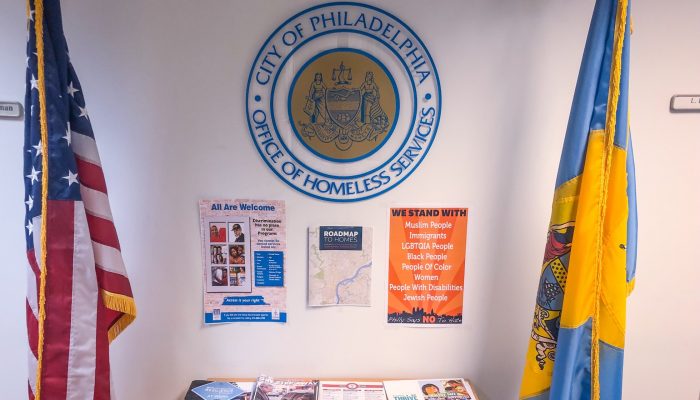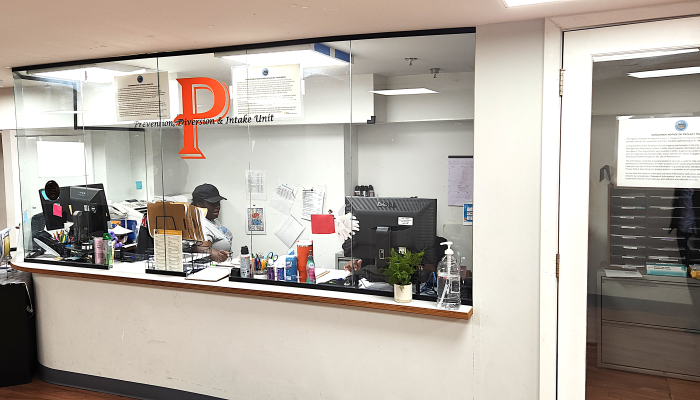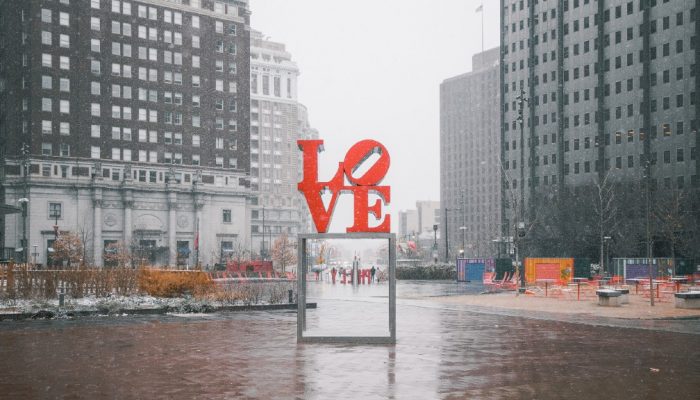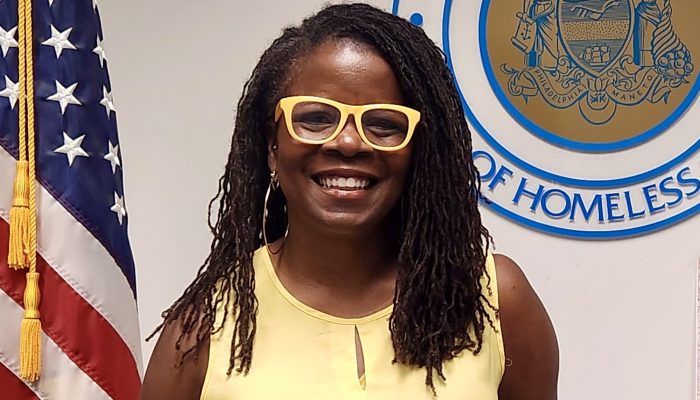When you walk into a government office, hospital, library, or business, the first few moments are key. The feelings you have coming in, and whether or not you feel welcome or seen as a person, leave a lasting impression. Trauma-informed design includes designing processes and approaches, meeting people where they’re at to better serve them.
When people come to the Office of Homeless Services for help, whether they’re literally homeless or facing imminent homelessness, they typically first encounter our front desk service representatives.
So, we talked with three of them — Civitavecchia Scott who works in our administrative offices in the Municipal Services Building, Claritza Jaquez who works in the Appletree Family Center, and Lisa Weaver, who works in the Roosevelt Darby Center — to learn about their typical day, why they work for the City of Philadelphia, and what keeps them grounded.
What do front desk staff do and how do they help people?
Claritza: At Appletree, we primarily serve people who are seeking shelter or rental assistance. They’ll call the front desk or walk in to receive services. I strive to help as many participants as I can. On a busy Monday, I usually sign in over 60 people. I’m often the first face people see or the first voice they hear on the phone.
Lisa: After security, front desk staff are the first contact or face people see at Roosevelt Darby. As the first contact people are having, it’s important for me to not just listen but also hear what the person is saying and be able to assess what their needs might be. That way, I can direct their need accordingly. Some might be in need of housing funds, others might be a stranded travelers, some might need directions to the county assistance or Social Security office. So it’s my responsibility to greet with understanding, listen with ears that hear, assess their need, and collect information needed by other staff.
Civitavecchia: Here at the MSB, we act as an information hub to anyone seeking assistance along with a variety of questions about homelessness. For many in need, we’re in the initial step in the process when they need help with eviction notice, a security deposit, somewhere to lay their heads for the night, or the next hot meal. Our job is to listen to callers who are typically hungry, scared, or feeling alone or in despair. We must give them accurate information and somewhere to turn. We also greet guests coming in for the numerous meetings held here at the MSB.
It can be challenging being on the front lines since everyone comes to you first, sometimes from extremely traumatic circumstances. How do you remain focused on helping amid so much going on?
Claritza: I have an even temperament in general and listen to music, eat as healthy as possible, smile often, and pray regularly. I enjoy helping others and those less fortunate, so self-care helps me remain focused throughout the day.
Lisa: You learn how to multitask, prioritize, and organize. Most important, however, is that you have to have a heart for people.
Civitavecchia: I focus on the fact that if I do not provide information to the people who need it, there’s a chance a child may be unnecessarily sleeping on the streets tonight. I do not want to think that because my head was wrapped around something else that a child had to experience sleeping on the ground, in a car, on a stranger’s porch or steps — or even worse. Nothing pulls at my heart more than knowing a child might face these conditions because a loved one needed information they should’ve been able to get from me. It focuses me.
Why did you choose the City of Philadelphia as your employer?
Claritza: It came from a love of volunteering and serving others that I’ve possessed ever since I was a young child, expressing great enthusiasm for church and school service events. I feel best when I am striving to create positive changes in my community. Social services have been a part of my life for a very long time, and I wanted it to continue on a professional level.
Lisa: It’s sappy to say I love this city. However, I do! More importantly, as I watched some of the changes that the current administration began to make, I became more hopeful for this city. I hope whatever little I contribute daily in the lives of my fellow citizens will somehow make a change in someone’s life and in this city. Each little change combined with other little changes make for great change and growth!
Civitavecchia: I chose the City of Philadelphia as an employer in part for job security and stability. When I was looking for work in the 2000s, there were many people I knew in the process of being laid off or downsized or simply unable to find work. My mother-in-law suggested the City would be a good option to serve others along with full-time work, great salary, benefits, and job security. All these years later, I have to agree!
In human services, it’s easy to develop what’s called “compassion fatigue” or secondary trauma. How do you deal with that?
Claritza: Being consciously thankful waking up each morning, thinking about all the things for which I feel grateful — my faith, my family, and my children — along with other self-care strategies help me reduce burnout.
Lisa: Meditation and prayer! I make time to debrief or nap every day: my household understands that from 5 p.m. until 7 p.m. is “my” time. I take hot candlelit baths with soft music! Or, I dance with my grandchildren. And I try to laugh as much as possible.
Civitavecchia: Organization and prioritizing. I tell myself that I can only deal with one fire at a time. I only allow one thing to occupy space in my time. Once that one thing is handled, it’s time to move onto the next. I also remind myself that I’m one person than can’t do everything for everyone, but I do work for a department that is doing everything it can collectively to help those in need — and I know that typically those needs will be met. I don’t feel alone here. Plus, I regularly see progress, I hear progress. That’s a tremendous help.
What’s the best thing about Philly?
Claritza: The diverse cultures and people — and of course the food!
Lisa: I love the culture of Philly, restaurants, activities, and history of Philly! I love that you can still find neighborhoods where neighbors know and look out for each other, even amid some of the bad things we see on the news.
Civitavecchia: It’s gritty, it’s beautiful, it’s elegant, it’s raw, it’s stylish. Philly has a soul. It’s its own being. It’s like you and me and we. Philly has great food, fun places, great people, and it’s honest. Philadelphia will tell you about yourself in a way not even your closest friends will! It feels familiar because it reminds you of yourself. No matter who you are, there is a part of the city you will be able to relate to. My favorite part of Philly is all that.
What do you wish your coworkers here at OHS knew about your work?
Claritza: That we’re all here to serve the public! Helping others is what drives me to go on daily. I’m lucky enough to help and serve those less fortunate.
Lisa: That I hope every day that’s what done at the front desk represents what’s expected and puts the Office of Homeless Services and the Roosevelt Darby Center’s best foot forward.
Civitavecchia: I try my best to perform my job so my coworkers can do theirs. I also want them to know that I appreciate and admire them for the work they do. We’re all important pieces of the puzzle to end homelessness, and I’m proud of them all.




